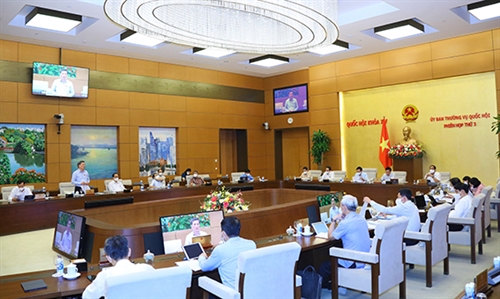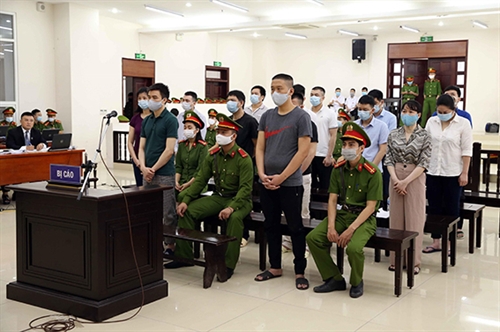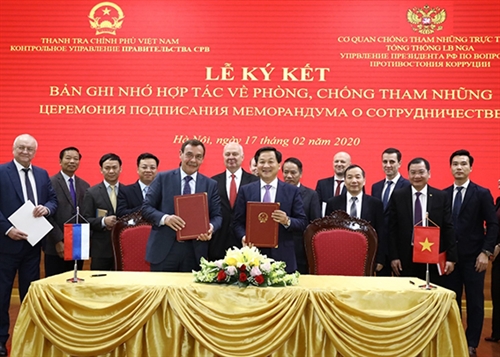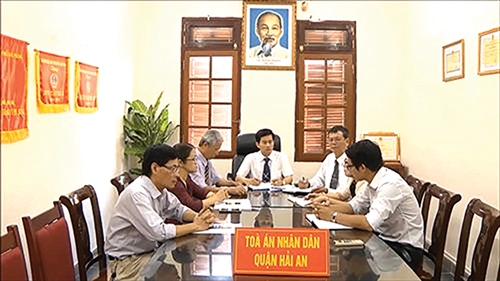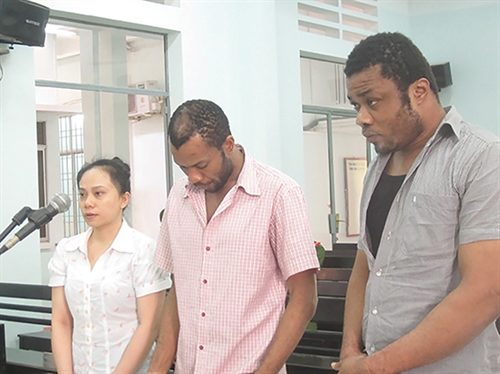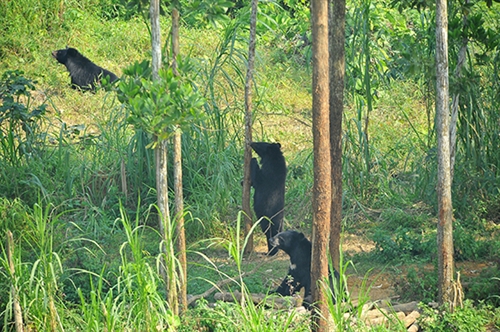Nguyen Cong Long, LL.D.
National Assembly’s Committee on Judicial Affairs
Vietnam’s National Assembly (NA) last month passed the Law Amending and Supplementing a Number of Articles of the Criminal Procedure Code (the Code) to be effective on December 1, 2021. A key reason for the NA to consider and pass these revised provisions right at a single session was to fulfill Vietnam’s commitments under the Comprehensive and Progressive Agreement for Trans-Pacific Partnership (CPTPP). Below we look into the Law’s provisions that have been designed to meet the CPTPP’s requirements on taking the initiative to initiate legal action to protect industrial property rights over trademarks and geographical indications.
CPTPP’s requirements on protection of industrial property rights
Article 18.77.6.g of the CPTPP provides: “Each Party allows its competent authorities to act upon their own initiative to initiate legal action without the need for a formal complaint by a third person or rights holder against acts specified in Clauses 1 thru 5 of this Article, including willful trademark counterfeiting, copyright or related rights piracy, willful importation or exportation of counterfeit trademark goods or pirated copyright goods, willful importation and domestic use of a label or packaging, and unauthorized copying of a cinematographic work.”
In addition, Article 18.30 provides that the Parties recognize that geographical indications may be protected through a trademark or sui generis system or other legal means.
Under Article 226.1 of Vietnam’s Penal Code, subject matters of industrial property rights protectable with criminal penalties include trademarks and geographical indications currently under protection in the country.
However, when it comes to criminal procedure, competent bodies may initiate criminal cases against the crime of infringing upon industrial property rights under Article 226 of the Penal Code only when infringed parties (victims) so request[1].
As per the above provisions, in case any Vietnamese or foreign trademark or geographical indication registered for protection in Vietnam is infringed upon, if wishing to get protection and enforcement under the criminal justice mechanism, its owner must file a written request for initiation of a criminal case. As reported by the Supreme People’s Procuracy, Articles 155.1 and 157.8 of the Code remained inconsistent with the CPTPP’s relevant provisions[2]. It then proposed the NA to amend Article 155.1 by removing infringements upon industrial property rights from the category of crimes against which criminal cases must be initiated only at the request of victims. This aims to ensure consistency with the provision allowing competent authorities to act upon their own initiative to initiate legal action without the need for a formal complaint by a third person or rights holder as per the CPTPP[3].
Although some NA deputies argued that the CPTPP’s requirements were limited to protecting trademarks and therefore Vietnam should revise the Code’s provisions regarding only trademarks, setting aside geographical indications, and respect the discretion of victims in requesting initiation of criminal cases[4], the NA still voted for the Supreme People’s Procuracy-proposed revision. As a result, as of the effective date of the Code’s revised provisions, competent bodies may initiate legal action against acts of infringing upon trademarks and geographical indications registered for protection in Vietnam without the need for requests of infringed parties for such legal action.
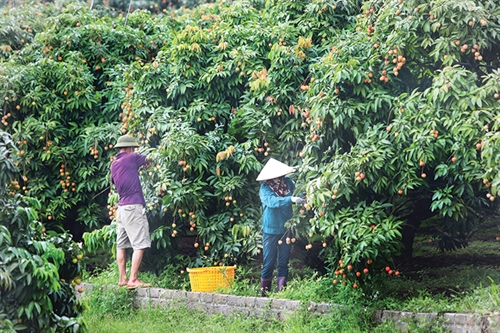 |
| Luc Ngan litchi is the first farm produce of Vietnam that has been granted a geographical indication certificate in Japan__Photo: Danh Lam/VNA |
Impacts of the revision of the Code’s provisions
In the context of Vietnam’s rapid economic development, imitation and counterfeiting of trademark goods have become an enormous challenge. This rampant problem has been undermining fair competition, damaging the interests of law-abiding producers and traders as well as consumers and causing heavy socio-economic losses. In fact, as assessed by functional agencies, almost all genuine products are facing the risk of being imitated or counterfeited[5]. For example, as much as 80-90 percent of products bearing the well-known geographical indication of Nuoc mam Phu Quoc (Phu Quoc fish sauce) on the domestic market are counterfeit[6].
On the contrary, results of the handling of infringements upon trademarks and geographical indications remain unsatisfactory. During the period from the effective date of the Code (January 1, 2018) to April 30, 2021, investigation bodies nationwide initiated only 19 criminal cases against industrial property rights infringements, including nine trademark infringements and no geographical indication infringement.
This can be partly attributed to the failure of the Law on Intellectual Property to enable geographical indication owners to fully exercise their rights. For example, under the Law’s Article 88, the State allows three kinds of entities, (i) organizations and individuals producing products bearing geographical indications, (ii) collective representations of such organizations and individuals, and (iii) administrative management agencies of localities subject to geographical indications, to exercise the right to register geographical indications. As such, all these entities may request initiation of criminal cases under Article 155.1 of the Code against acts infringing upon industrial property rights over geographical indications. However, in reality, local administrations have never performed the responsibility to participate in criminal proceedings to protect infringed geographical indications, while producers of products bearing such geographical indications have paid little attention to protecting them or can hardly detect infringements. Even when they are aware about infringements of geographical indications that they and many other entities are commonly using, they are not totally willing to request initiation of criminal cases against infringers[7].
Besides, the determination of infringements upon industrial property rights as one of the crimes against which criminal cases must be initiated at the request of victims[8] is no longer reasonable. The reasons for this argument are many. First, acts of infringing upon industrial property rights over trademarks and geographical indications not only undermine the economic management regime, thus causing damage to the property and commercial prestige of trademark and geographical indication owners, but also directly harm the health and property of consumers of imitate and counterfeit goods. Second, victims of this crime are not only trademark and geographical indication owners but also consumers, and permitting only the former to request initiation of criminal cases is unreasonable to fully protect interests of parties whose rights are infringed upon. Third, such provision might hinder competent authorities from promptly handling infringements, especially infringements upon foreign trademarks or geographical indications which cause damage to the health and property of Vietnamese consumers. In this case, their handling will depend on whether or not foreign trademark or geographical indication owners request competent Vietnamese proceeding-conducting bodies to do so.
The revised provisions of the Code would therefore help ensure Vietnam properly implement the CPTPP and at the same time address the current problems and inadequacies in the Law on Intellectual Property and the Code’s provisions on protection of industrial property rights over trademarks and geographical indications.
In sum, we can assess positive impacts of the Code’s revised provisions aimed to ensure the proper implementation of the CPTPP in the following specific aspects.
Firstly, they attest to in an active and lively manner the motto “the Socialist Republic of Vietnam acts as a friend, reliable partner and responsible member of the international community”[9]. Accordingly, with the Code’s revised provisions aimed to help proceeding-conducting bodies take the initiative in handling infringements upon industrial property rights, Vietnam has fully fulfilled its commitments under and early implemented the provisions of the CPTPP.
Secondly, they help significantly improve the mechanism of enhanced protection of trademarks and geographical indications in Vietnam and concurrently protect the interests of the State and consumers as well as lawful rights and interests of producers of products bearing trademarks and geographical indications registered for protection in Vietnam. They also contribute to enhancing the state management of industrial property and ensuring consistency with the country’s Intellectual Property Strategy through 2030 published in 2019.
Finally, they help ensure consistency of criminal justice policies on handling of infringements upon industrial property rights over trademarks and geographical indications which are of similar nature, characteristics and social danger. Particularly, cancellation of the requirement on filing of requests for initiation of criminal cases against industrial property rights infringements would help raise the sense of responsibility of law enforcement bodies and the effectiveness of the combat and handling of these infringements.-
[1] Article 155.1 of the Code.[2] Report 138/BC-VKSTC dated October 1, 2021, of the Supreme People’s Procuracy, on results of the review of the provisions of Criminal Procedure Code 101/2015/QH13 that are relevant to provisions of the CPTPP.[3] To ensure consistency, Article 157.8 of the Code is also revised toward annulling reference to Article 226.1 of the Penal Code. Accordingly, the fact that victims do not request initiation of criminal cases is no longer considered a ground for non-initiation of criminal cases against the crime prescribed in Article 226.1 of the Penal Code.[4] Examination Report 179/BC-UBTP15 dated October 11, 2021, of the NA’s Justice Department.[5] Source: https://cand.com.vn/Thi-truong/Toa-dam-Nang-cao-hieu-qua-trong-dau-tranh-chong-hang-gia-hang-nhai-va-bao-ve-thuong-hieu-doanh-nghiep-i454194/.[6] Report 136/BC-VKSTC dated October 1, 2021, of the Supreme People’s Procuracy.[7] Ibid.[8] Under Articles 155 and 157 of the Code.[9] Article 12 of the 2013 Constitution of the Socialist Republic of Vietnam.


